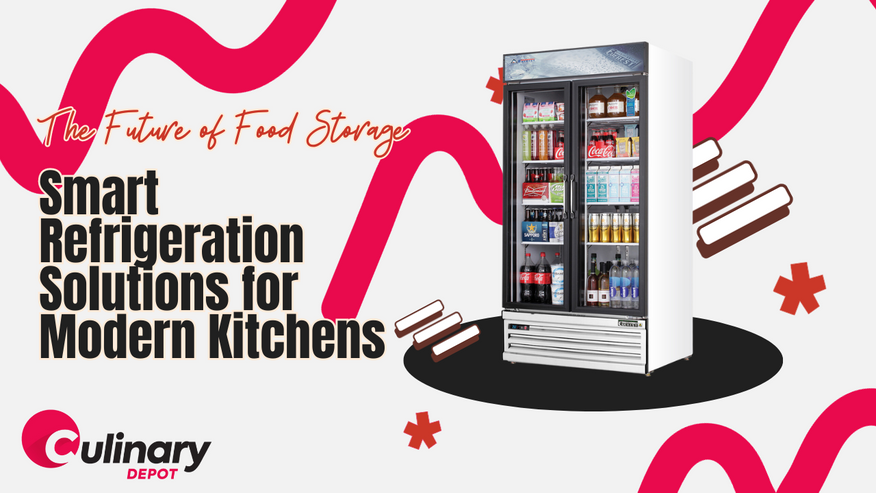Nov 3rd 2023 - Team Member
Smart Refrigeration Solutions for Modern Kitchens: The Future of Food Storage
In the fast-paced world of commercial kitchens, staying ahead of the curve is not just a matter of preference; it's a necessity. With the culinary landscape constantly evolving, the demand for more efficient and innovative food storage solutions has never been higher. This is where smart refrigeration comes into play, revolutionizing the way we store and preserve ingredients.
The Smart Refrigeration Revolution
Smart Commercial refrigeration is not just about keeping food cold; it's about leveraging technology to create a seamless, efficient, and intelligent food storage environment. These cutting-edge refrigeration systems are equipped with a range of features that go beyond basic temperature control. Let's delve into the key aspects that define the smart refrigeration revolution:

1. Temperature Precision
Traditional refrigeration systems often come with a degree of temperature variation. Smart refrigerators, on the other hand, offer precise temperature control within a fraction of a degree. This level of accuracy ensures that food is stored under ideal conditions, preserving its quality and safety.
2. Remote Monitoring
One of the standout features of smart refrigeration is the ability to monitor the unit remotely. With the help of integrated sensors and IoT (Internet of Things) technology, chefs and kitchen managers can keep tabs on temperature, humidity, and other critical factors via their smartphones or computers. This real-time monitoring helps prevent spoilage and food waste.
3. Alerts and Notifications
Smart refrigerators are programmed to send alerts and notifications when conditions deviate from the desired range. Whether it's a sudden temperature spike or a power outage, these systems immediately notify the responsible personnel. This proactive approach can save thousands of dollars in spoiled inventory.
4. Energy Efficiency
Commercial kitchens are notorious for their energy consumption. Smart refrigeration addresses this issue with energy-efficient features like LED lighting, advanced insulation, and variable-speed compressors. These systems can significantly reduce energy costs while minimizing the environmental footprint.
Customized Storage Solutions
Smart refrigeration is highly adaptable and can be customized to suit the specific needs of different food products. For example:
1. Variable Humidity Control

Many smart refrigeration units offer adjustable humidity settings. This is crucial because different types of food require different humidity levels for optimal preservation. Leafy greens and vegetables thrive in higher humidity, while dry goods like grains and flour need lower humidity to avoid clumping.
2. Zones for Specialized Storage
Some smart refrigerators have multiple zones with distinct temperature settings. For example, one zone may function as a wine cooler, while another can serve as a freezer. This versatility allows chefs to store a wide range of ingredients in a single unit, reducing the need for separate appliances.
3. Inventory Management
Modern smart refrigerators are equipped with built-in inventory management software. These systems track the products stored inside, their shelf life, and even suggest recipes based on available ingredients. This feature is a game-changer for busy kitchens, helping reduce food waste and streamline the cooking process.
The Green Advantage
Sustainability is a hot topic in the foodservice industry, and smart refrigeration aligns perfectly with this trend. These systems are designed to minimize environmental impact:
1. Refrigerant Choices
Smart refrigerators often use environmentally friendly refrigerants that have a lower Global Warming Potential (GWP). This reduces the greenhouse gas emissions associated with cooling systems.
2. Energy Star Certification
Many smart refrigeration models come with the Energy Star label, signifying their exceptional energy efficiency. Choosing such units can lead to substantial energy savings and lower operating costs.
Conclusion
The future of food storage in modern kitchens is undeniably smart refrigeration. These innovative systems offer precision, convenience, and sustainability, addressing the unique challenges of the foodservice industry. By incorporating these technologies into their operations, commercial kitchens can not only enhance food safety and quality but also reduce costs and environmental impact. As the culinary world continues to evolve, smart refrigeration is a powerful tool for chefs and kitchen managers to stay ahead of the curve and deliver excellence to their customers.

